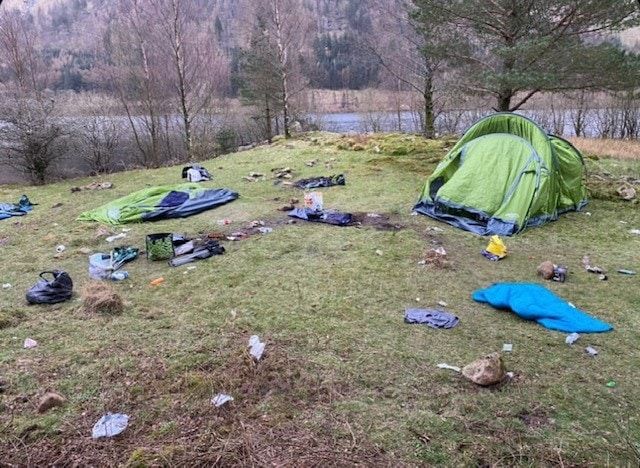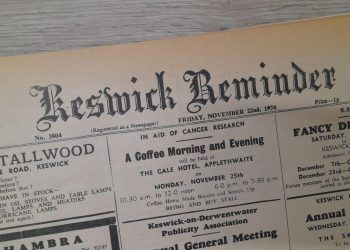
Wild campers blighted a Lake District beauty spot at the weekend by leaving behind a trail of trash for others to clean up.
Their anti-social actions on the shores of Thirlmere have earned them the condemnation of conservation groups and the police, who are now bracing themselves for an influx of visitors this summer, following the latest easing of COVID restrictions, which allow people to travel locally again.
Nicola Bolton, who last year launched a clean up group called The Lakes Plastic Collective, described the scenes of discarded detritus as “heartbreaking and very worrying.”
The campers had left lots of gear, including five tents, pillows, blow-up mattresses, a blanket, food, big bags of sweets, wrappers, cans, plastic bottles, several glass drink bottles — empty and half full — American-style red party cups, nitrous oxide canisters, tissues, wipes and human waste.
Thirteen large bags of rubbish were collected by volunteers on Saturday and the rest by members of the collective and Lake District National Park Authority rangers.
“It’s by far one of the worst fly camp sites I’ve come across — and I feel that it’s not going to be the last,” said Nicola.
“Most normal wild campers leave no trace. It’s the golden rule, but this new breed of fly camper is completely disrespectful and give no thought for the area or the people who are left to clean up after them. It is the start of what’s going to be a very long summer.”
Cumbria’s assistant chief constable Andy Slattery, who also chairs the county’s multi-agency COVID-19 Strategic Co-ordination Group, said he was really disappointed with what had taken place at Thirlmere, but was not surprised.
He said that the behaviour was typical of what his officers and representatives of other agencies had witnessed last summer.
He said this coming summer was likely going to be the busiest the national park has ever experienced with the area also having to cope with some of the 17 per cent of people in the UK who would normally jet off abroad for their holidays.
“We have worked really hard to get more camping and car parking and more toilets set up to cope with the expected influx of visitors and stop people indulging in this type of behaviour,” he said.
He added that farmers and landowners had taken advantage of the opportunity to establish temporary campsites and that “if done well and in the right places they have the potential to reduce the impact of anti-social behaviour in the national park.”
“I understand some of the concerns about the location of some of the sites, but it’s the right thing to do to prevent the sort of damage that we saw at Thirlmere this weekend,” he said.
Mr Slattery said it was important to lure visitors away from sensitive areas like Thirlmere and onto campsites and caravan parks where there is adequate parking and toilet facilities.
He said compliance and enforcement was also important with the Lake District National Park Authority increasing patrols to educate campers and stop them indulging in anti-social behaviour.
He said the Thirlmere party was one of 16 groups which had been illegally wild camping in the Lake District over last weekend.
He said that when challenged by patrols most people wild camping were prepared to tidy up and move on.
Those leaving a mess like that seen at Thirlmere would likely be prosecuted for fly-tipping and investigations are ongoing in a bid to find those responsible.
Mr Slattery said even though restrictions have been eased there are still circumstances which people can fall foul of COVID regulations and added that it was still illegal to camp with more than one household sharing a tent or vehicle such as a camper van.
Douglas Chalmers, chief executive of Friends of the Lake District, said: “It’s really sad that people can behave this way without thought for the environment and we hope that it’s not a sign of things to come – that this summer will be like last year.
“Local communities and agencies are better prepared this year, but damage like this simply shouldn’t happen.
“Simple respect for where people are would help to keep this landscape glorious and safe for everybody else and wildlife too.”








